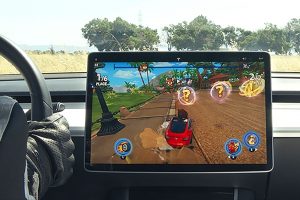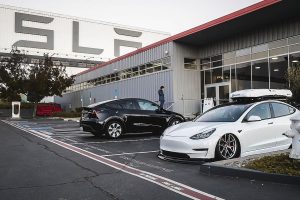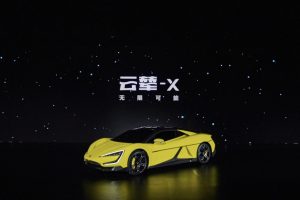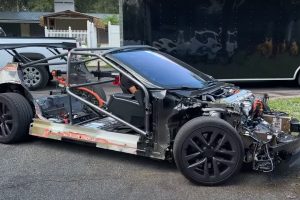- 🚗 Tesla plans to produce its next-gen EV, codenamed “Redwood,” starting mid-2025.
- 🌐 The new vehicle aims to fill the affordable segment, currently unaddressed by Tesla’s premium Model 3 and Model Y.
- 🔄 Tesla has informed suppliers about the production timeline for its next-generation platform.
- 🚙 Described as a compact crossover, the “Redwood” model is expected to be a mass-market electric car.
- 💬 Tesla sent “requests for quotes” for the “Redwood” model to suppliers last year, indicating progress in development.
- 📈 Production expectations for the affordable vehicle are set at approximately 10,000 units per week.
- 📅 Production is slated to begin around June 2025, with volume production likely starting in 2026.
- 🔄 Tesla’s study of conventional car manufacturing methods, exemplified by dismantling a Honda Civic, contrasts with the expected unboxed process for next-gen vehicles.
- 💲 The affordable “Redwood” model, starting at about $25,000, aligns with earlier mentions in Elon Musk’s biographies.
- 🌟 Musk expresses excitement, stating that the design and manufacturing innovations for the next-gen EVs will be industry-leading.
In the ever-evolving landscape of electric vehicles, Tesla is once again at the forefront, gearing up to introduce a groundbreaking model that could reshape the market dynamics. Codenamed “Redwood,” Tesla’s next-gen electric vehicle is poised to hit production lines by mid-2025, signaling a strategic move to capture the affordable segment that has eluded the automaker’s previous offerings.
Aiming for Affordability in a Premium Lineup
Despite Tesla’s success with the Model 3 and Model Y, both recognized as premium vehicles, the company recognizes the need to address a broader audience seeking more affordable electric options. The “Redwood” model is positioned to bridge this gap, aligning with Tesla’s commitment to sustainable transportation for a wider demographic.
Supply Chain Dynamics: Tesla’s Strategic Communication with Suppliers
Tesla’s proactive communication with suppliers is a crucial indicator of the company’s commitment to the “Redwood” project. By informing suppliers about the mid-2025 production timeline for the next-gen platform, Tesla establishes a collaborative approach, ensuring a streamlined supply chain and addressing potential challenges well in advance.
The “Redwood” Vision: A Compact Crossover for the Masses
Described as a compact crossover, the “Redwood” model is not just another addition to Tesla’s lineup; it represents a strategic foray into the mass-market electric car segment. The compact design aims to offer versatility, making it suitable for a wide range of consumers who seek a balance between size, performance, and affordability.
Requests for Quotes: Progress in Development
The fact that Tesla sent “requests for quotes” to suppliers last year indicates that the development of the “Redwood” model is well underway. This proactive engagement with suppliers suggests that Tesla is not only committed to meeting its production targets but is also actively seeking input from key partners to enhance the overall quality and efficiency of the upcoming electric vehicle.
Scaling Up Production: Ambitious Targets for Volume
Tesla’s ambitious production targets for the “Redwood” model are indeed noteworthy. With expectations set at around 10,000 units per week, the company aims to make a significant impact on the electric vehicle market. This level of production, if achieved, could position Tesla as a major player in the mass-market segment.
The Roadmap: From June 2025 to Volume Production in 2026
Tesla’s projected timeline for the “Redwood” model indicates a phased approach. Starting production around June 2025 allows the company to fine-tune operations and address any initial challenges. The transition to volume production in 2026 suggests a carefully planned scaling strategy, ensuring sustainable growth and market penetration.
Innovation in Manufacturing: Unboxed Process vs. Conventional Study
Tesla’s unique approach to studying conventional car manufacturing methods, exemplified by the dismantling of a Honda Civic, highlights the company’s commitment to innovation. While conventional methods served as a reference point, Tesla’s next-gen vehicles are expected to follow an unboxed process, showcasing the brand’s dedication to pushing boundaries.
Affordability Defined: The $25,000 Price Point
One of the most significant revelations about the “Redwood” model is its expected starting price of around $25,000. This aligns with earlier mentions in Elon Musk’s biographies, emphasizing Tesla’s commitment to making electric vehicles more accessible to a broader audience.
Musk’s Excitement: A Glimpse into the Future
Elon Musk’s enthusiasm about the upcoming affordable Teslas is contagious. His statements during the annual shareholder meeting, where he mentioned industry-leading design and manufacturing innovations, hint at a game-changing approach that could set new standards for the electric vehicle industry.
In conclusion, Tesla’s venture into the mass-market electric car segment with the “Redwood” model signifies a significant milestone for the company and the industry as a whole. As Tesla continues to push the boundaries of innovation, the “Redwood” electric vehicle holds the promise of making sustainable transportation more accessible than ever.





